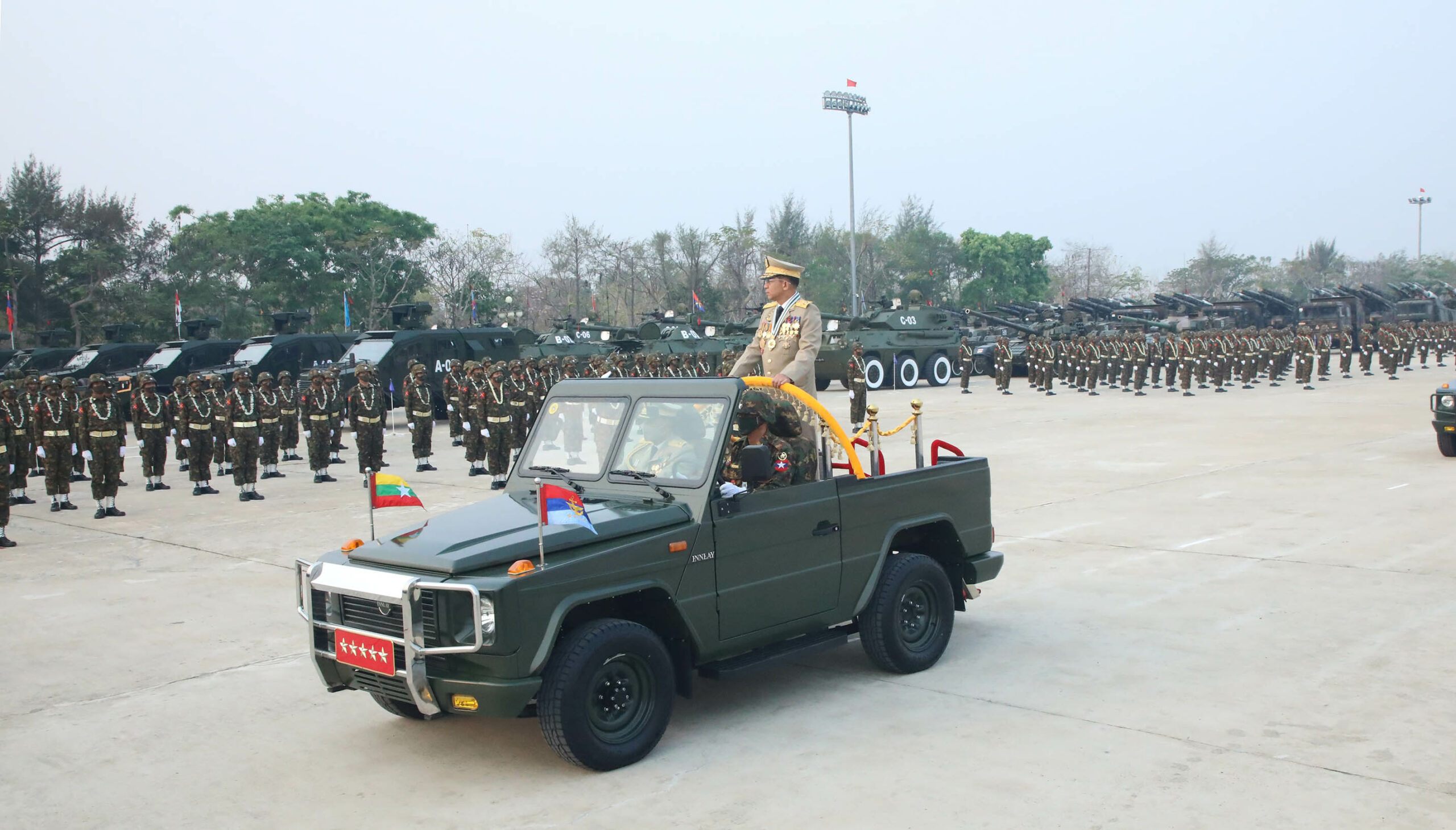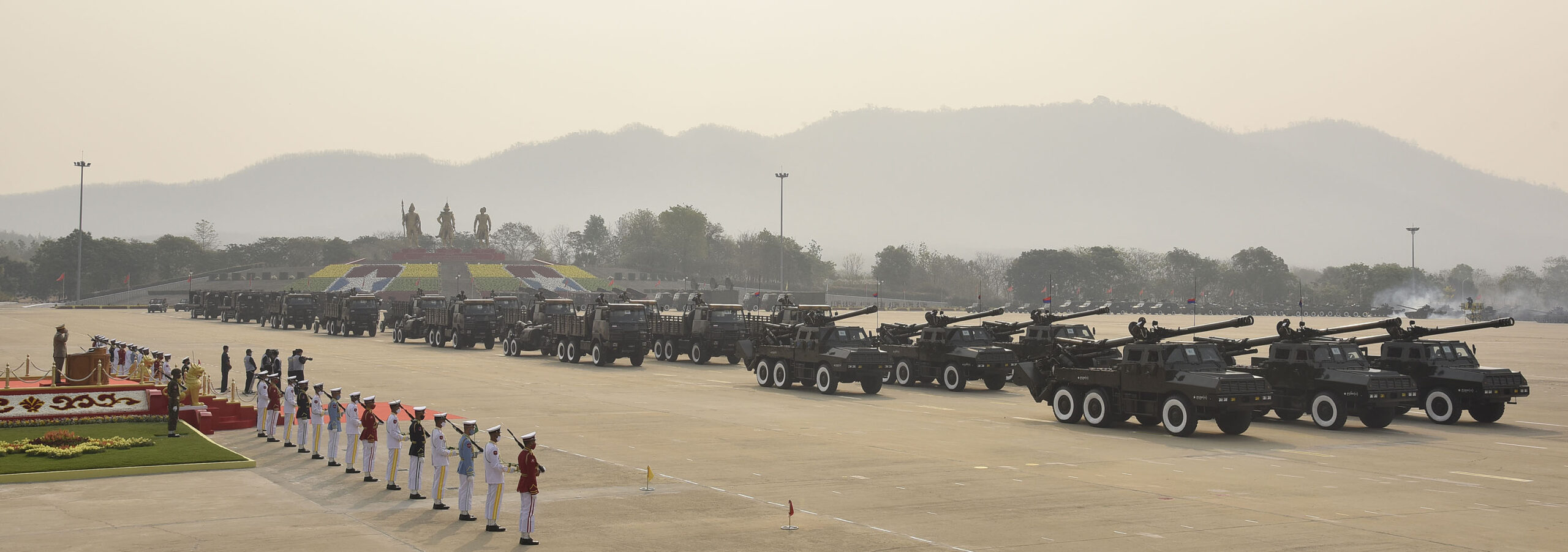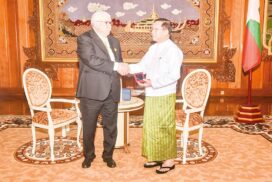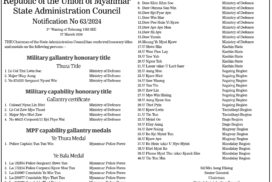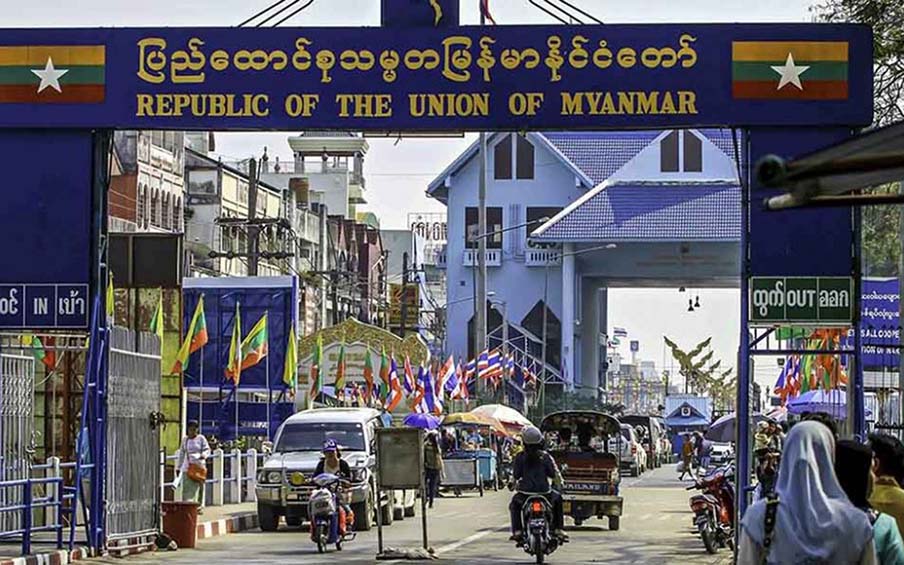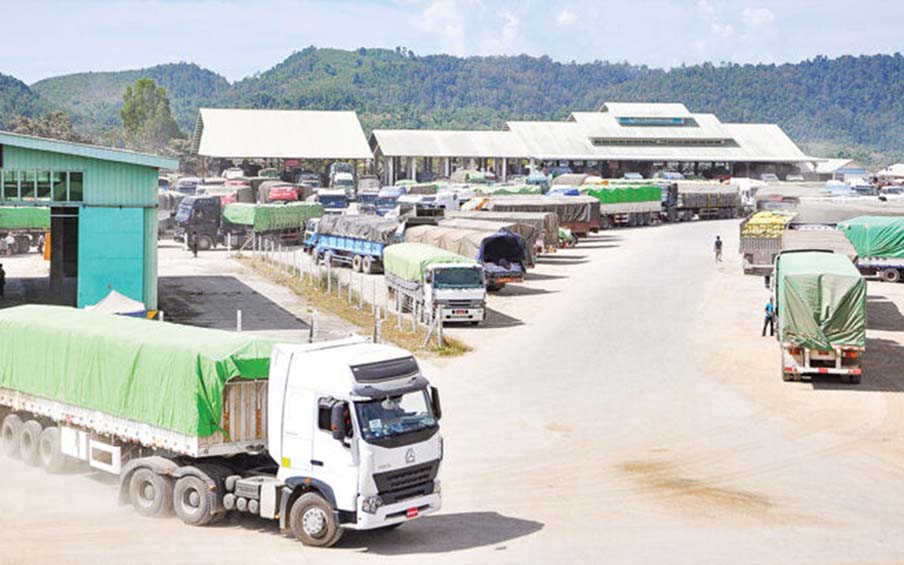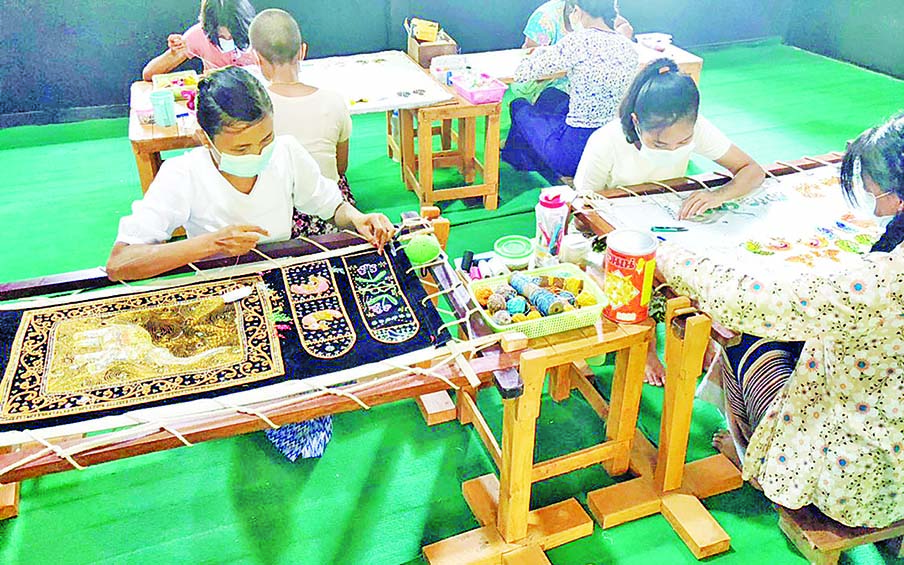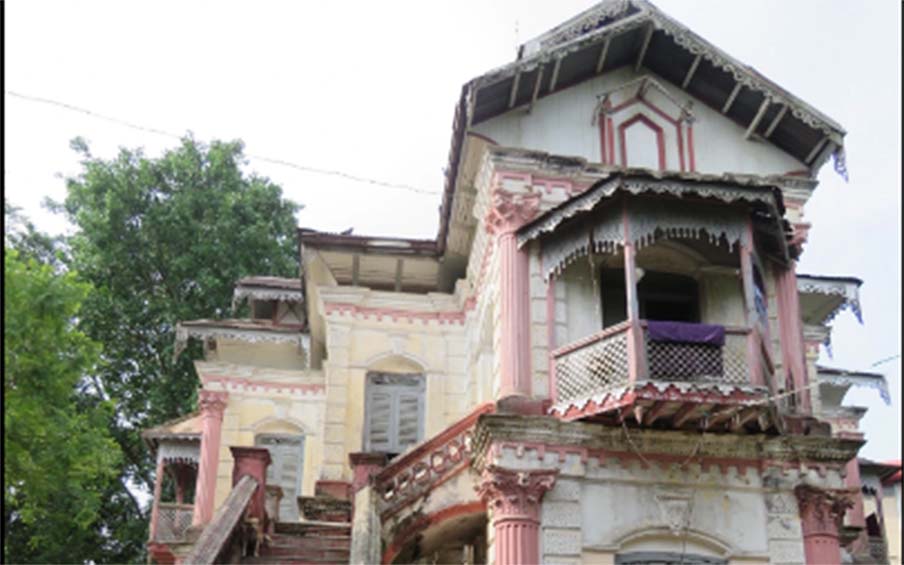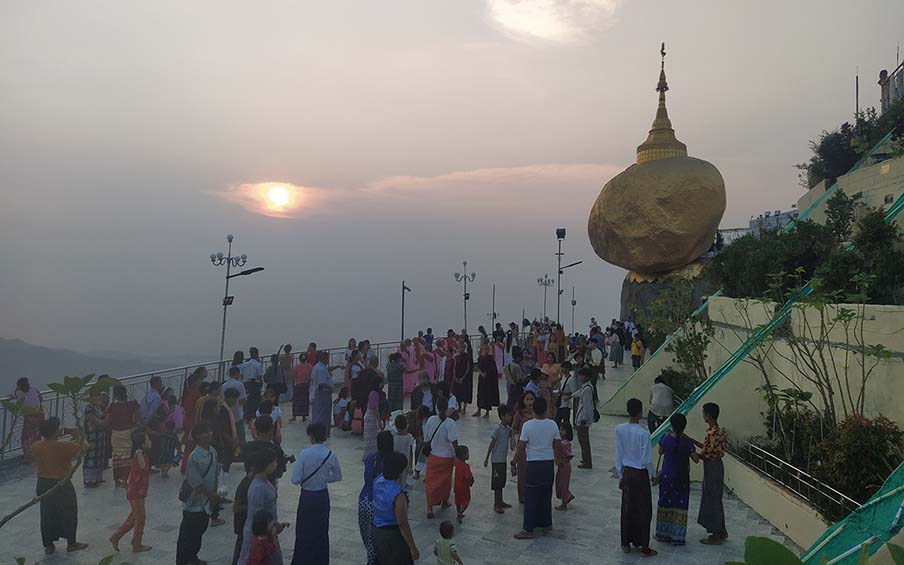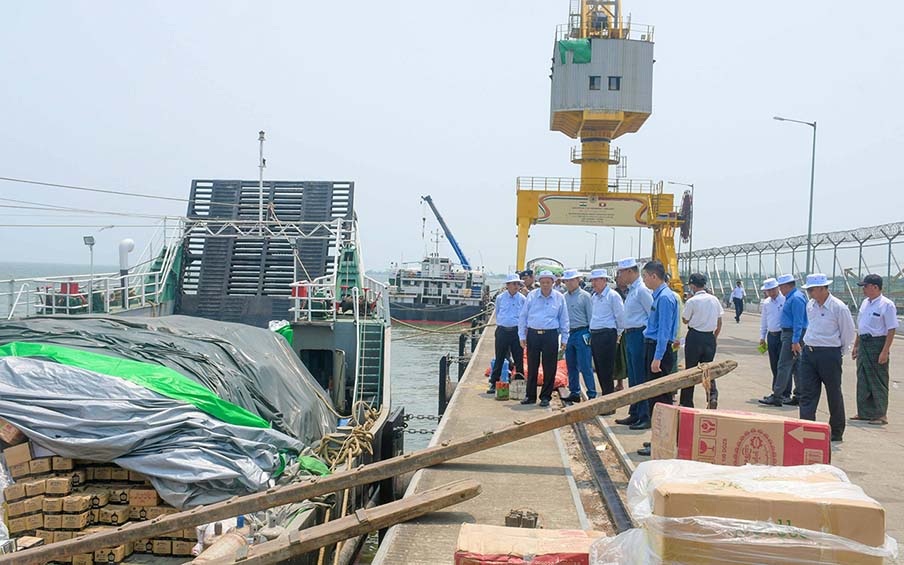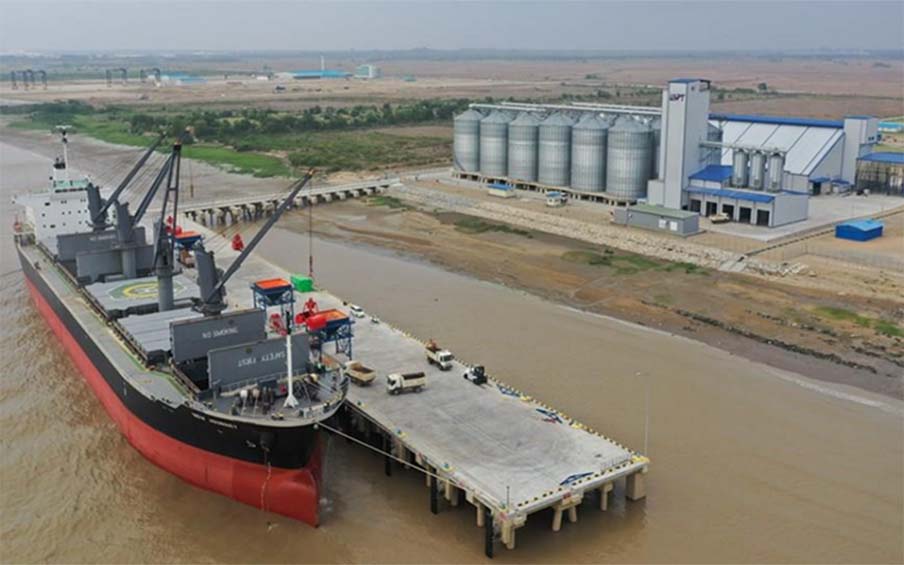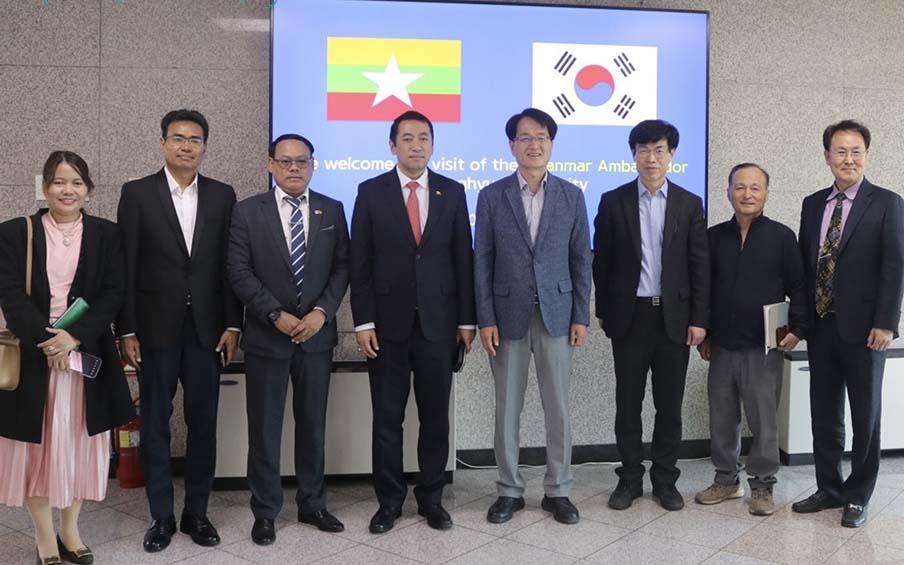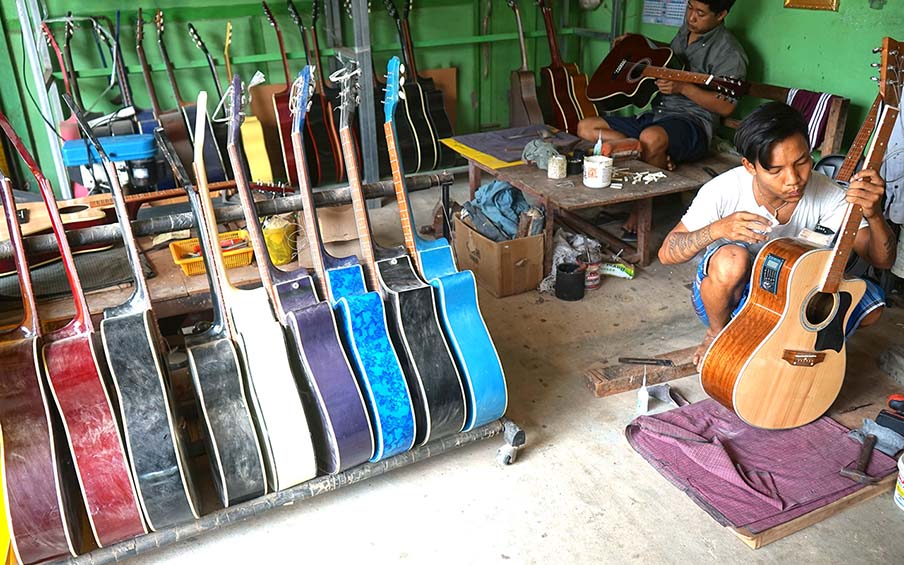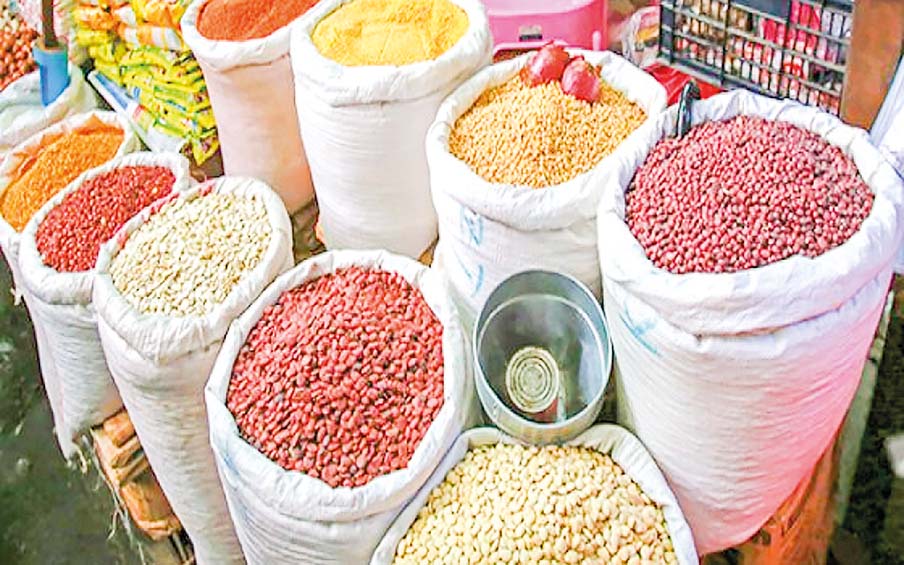By Kanaung
Military songs played by an army band filled the air as troops from the Anawrahta Column, Kyansittha Column, Bayintnaung Column, Aungzeya Column, Hsinbyushin Column, Bandoola Column and Aung San Column took up positions on the parade ground. This was the tradition-rich Tatmadaw, commemorating the 76th Anniversary of the Armed Forces Day, an unforgettable scene for a citizen.
The troops assembled on the parade ground represented the Tatmadaw Army, Navy and Air forces, the Myanmar Police Force, Navy SEALs, members of female special operation task force, and mechanized and airborne divisions of the Tatmadaw. The magnificent scene was a reminder of the long and proud history of the Tatmadaw, established after the country’s hard-won independence from the British. Throughout Myanmar’s pre-independence periods into the present, the Tatmadaw had commemorated its Silver, Gold and Diamond Jubilee milestones. Tatmadaw and police forces are the ones who sacrifice their lives to protect the country so that all citizens may live in peace, tranquillity, law and order.
March 2021 is also the month that marks the second-month tenure of the State Administration Council. The State Administration Council is steadfastly carrying out its State duties in accordance with its Five-Point Road Map and Nine Objectives. In these endeavours, the 2008 Constitution provides the overarching framework for ensuring peace and stability, and for serving the country and people. This report provides an overview of the work of the State Administration Council in March, as obtained from media releases.
Deliberations of the State Administration Council
On 1 March 2021, at the 4/2021 meeting of the State Administration Council, the State Administration Council Chairman noted the instigating role of social media posts in spreading unrest and fuelling violence and emphasized that the security forces would continue to exercise utmost restraint and the lowest level of response possible in every situation, in line with international norms for riot control. A democratic system provides for people to express their likes or dislikes within the rule of law. However, civil servants need to carry out the duties conferred on them by their positions in accordance with rules and regulations. Township administrative officers need to be free from party politics in order to restore order and stability.
Moreover, the Commander-in-Chief of Defence Services discussed the Five-Point Road Map, emphasizing the need for States and Regions to increase productivity and enhance agriculture. Measures should also be taken to revive sports competitions, including Myanmar martial arts, and reinvigorate the tourism and industrial sectors, in accordance with COVID-19 health protocols.
On 8 March 2021, at the 5/2021 meeting of the State Administration Council, the issue of stability and order was highlighted. The State Administration Council Chairman said although the security forces had used internationally accepted measures of crowd control and had not used forcible or violent means against protesters, the protests had turned into riots and violence from 28 February. In attempting to restore human security and rule of law, the security forces had employed the lowest level of response possible in the specific situation, in line with international norms for riot control. The so-called Civil Disobedience Movement (CDM) is a deliberate planned attempt to harm the country’s economy, aimed at destroying factories, industries, tourism, cash flow and production. The doctors in people’s hospitals who had joined the CDM were only harming the patients – the sick and the poor who can only afford to use people’s hospitals. Similarly, banks need to open as soon as possible to serve the public. In all cases, the media should act responsibly by providing balanced and neutral coverage of events.
The country must be well-equipped and prepared for responding to defence and security needs. To this end, when stability is restored, the State Administration Council Members would need to consider the implementation of the 2010 People’s Militia Law, which allows for conscription. Matters pertaining to actions taken against those participating in the illegal Committee Representing Pyidaungsu Hluttaw and related organizations were then discussed. Other issues highlighted at the meeting include programmes to promote public awareness of political affairs and educate the public on electoral fraud, actions taken with regard to citizen registration and identification cards in accordance with the prevailing laws, the reopening of Buddhist monastic schools, the status of ceasefire and peace negotiations and mine clearance operations, and the status of healthcare services.
The doctors in public hospitals who had joined the CDM were only harming the patients – the sick and the poor who can only afford to use public hospitals. Similarly, banks need to open as soon as possible to serve the public. In all cases, the media should act responsibly by providing a balanced and neutral coverage of events.
On 15 March 2021, at the 6/2021 meeting of the State Administration Council, the Chairman highlighted the implementation of security measures to enable the banks to reopen. The need to reopen universities and schools as soon as possible was emphasized, given the impact of closures on students, parents, and the country. Measures would be taken to invite local and foreign investment in industry and agriculture, especially the production of value-added agro-based goods. The State Administration Council also discussed the issue of providing greater support to ethnic language teachers and measures related to reviving domestic tourism.
On 22 March 2021, at the 7/2021 meeting of the State Administration Council, the agenda focused on efforts to accelerate the graduation of Myanmar from the list of the Least-Developed Countries as defined by the United Nations, the easing of travel restrictions, the review and scrutiny of region and state municipal committees, long-term planning of improvements in transport and communications for Phayathonzu region, the organization of the steering committee and working committees for the peace process, and measures to be taken to provide citizenship scrutinizing cards to every eligible citizen and every member of Myanmar’s national ethnic peoples.
On 11 March 2021, at the 3/2021 meeting of the Management Committee of the State Administration Council, the Chairman and Commander-in-Chief of Defence Services raised issues relating to the work of staff in the respective ministries. The government staff in each ministry are expected to discharge their duties responsibly, following democratic norms and principles. To this end, sessions should be held to clarify and raise staff awareness on workplace duties and responsibilities. The meeting also discussed the systematic steps being taken to reopen banks, hospitals and schools, together with the measures to ensure healthcare workers return to their duties.
The State Administration Council Chairman and Commander-in-Chief of Defence Services also toured the remote locations of Myanmar to meet with the military personnel and family members serving in those locations. These included the Myeik, Kyunsu and Cocogyun military stations on 20 March, the Tachilek military station on 28 March, and the Kengtung military station and the Triangle Region Command on 29 March 2021. During his visits, the Chairman explained the current situation of responsibility for State duties and on the plans and activities being implemented to advance the country’s development. The Chairman brought gifts of food for the troops, met and encouraged their families, and made appropriate arrangements to meet the requirements in those military stations.
From 11 to 14 March 2021, Vice-Chairman of the State Administration Council Deputy Commander-in-Chief of Defence Services Commander-in-Chief (Army) Vice-Senior General Soe Win met with military personnel, family members and military cadets in Kalaw, Aungban, Bahtoo and PyinOoLwin military stations. He explained the current situation and made appropriate arrangements to address their various needs. On 29 March 2021, the Vice-Chairman met with personnel serving in the Mandalay Station and the Mandalay Region Police Force.
On 30 March 2021, at the 8/2021 meeting of the State Administration Council, the Chairman emphasized that collective leadership was being exercised on the path to achieve the democracy to which people aspired. The Tatmadaw was only supporting the civilian administration bodies who are undertaking State duties. Despite the desire of the people for genuine multiparty democracy, the massive electoral fraud in 2020 had made a mockery of the democratic process. The Tatmadaw had taken a firm decision on helping the country achieve genuine multiparty democracy. The State Administration Council Members then deliberated on issues concerning national security, the rule of law, religious and social affairs, and regional development programmes. These included the peace process, the review of the law on child rights, the establishment of special courts in areas of the critical need for such justice, the amendment of income taxes to alleviate the public’s tax burden, control of rumours on social media, and reforms of news media.
76th Anniversary of Armed Forces Day
The Parade of the 76th Anniversary of Armed Forces Day was successfully held on 27 March 2021 and live-streamed on national television. State Administration Council Chairman Commander-in-Chief of Defence Services Senior General Maha Thray Sithu Min Aung Hlaing took the salute of the Assembled Columns of military forces and Myanmar Police Force, after which he inspected the Columns. All participants then saluted the flag of the Union. Member of the armed forces then saluted the fallen Tatmadaw personnel who had sacrificed their lives for the country and took the Four-Point Pledge of Loyalty.
In his address at the 76th Armed Forces Day of Tatmadaw, the Commander-in-Chief of Defence Services highlighted the immense prestige of the Tatmadaw that was etched in the annals of history, and the steadfastness of the Tatmadaw’s commitment to protecting the motherland throughout successive terms of government. The Commander-in-Chief of Defence Services pointed out that the event had originally been planned to commemorate the 75th Anniversary (Diamond Jubilee) of Armed Forces Day but had been postponed due to the COVID-19 pandemic. The Tatmadaw should be proud that it has upheld its noble traditions throughout successive generations over decades.
In his speech, the Senior General reiterated the principle that the Tatmadaw is part of the nation and that military personnel are part of the people. Accordingly, the Tatmadaw would always stand by the Myanmar people and, through rain or shine, strive to ensure peace and security for all citizens. The Tatmadaw would work towards securing a peaceful and developed Union based on democracy and federalism, for the Myanmar nation and people to stand tall on the world stage.
On 25 March 2021, the Defence Services Museum held a ceremony to honour the past and present Commanders-in-Chief of Defence Services by unveiling their seven statues. The State Administration Council Chairman Commander-in-Chief of Defence Services spoke on the occasion, highlighting that the statues were made to honour those who had led the efforts to make the Tatmadaw the strong and durable institution it is today. The statues were a reminder that Myanmar’s independence must be cherished, a patriotic spirit must be nurtured, and human resources must be developed to build a peaceful, modern and developed nation.
Accordingly, the Tatmadaw would always stand by the Myanmar people and, through rain or shine, strive to ensure peace and security for all citizens. The Tatmadaw would work towards securing a peaceful and developed Union based on democracy and federalism, for the Myanmar nation and people to stand tall on the world stage.
National Unity and Peace Restoration
The State Administration Council’s Central Committee on National Unity and Peace Restoration held its first meeting on 3 March 2021. In this meeting, the Central Committee Chairman Senior General Min Aung Hlaing re-emphasized one of the key components in the State Administration Council Five-Point Road Map, that the clauses in the Nationwide Ceasefire Agreement would be implemented as a priority to achieve durable peace.
The Commander-in-Chief of Defence Services summarized the events that had led to the current situation. He had requested the previous government in person many times to hold the National Defence and Security Council meeting, as stipulated by the 2008 Constitution, with the wish to improve civil-military relations. But the previous government had repeatedly ignored the request. More recently, the previous government had also rejected the Tatmadaw’s repeated calls for dialogue between the Union Election Commission and political parties and for a meeting of the National Defence and Security Council to resolve the problem of vote-rigging. Therefore, the Tatmadaw had no choice but to assume the duties entrusted to it by the Constitution.
The Commander-in-Chief of Defence Services and Central Committee Chairman highlighted that given the diverse views on democracy and federalism in building a Union based on the principles of democracy and federalism, it would be necessary to choose a system suitable for the country. He emphasized that while there were different interpretations and standards regarding the term federalism, one could say that its main essence lay in Union and harmony. There is no State or Region in Myanmar that has only one ethnic race. Rather, States and Regions have many ethnic races living together, and a given ethnic group is also spread across more than a single State or Region. Therefore, all National peoples living in each State or Region are equal stakeholders for that State or Region, with equal ownership. It would benefit national unity immensely if each State or Region could be named to reflect the ownership of all National peoples living in that State or Region.
Regarding the position of the Tatmadaw, the Commander-in-Chief of Defence Services emphasized that after measures were taken to assure the required peace and stability, elections would be held, and the Tatmadaw would ensure the smooth transition of power to the winners and the formation of a new government. During this period, when the Tatmadaw had taken the reins of State power, ongoing processes, including the peace process, and various initiatives in the respective regions, would continue without losing momentum. Moreover, activities and systems not in accordance with the Constitution and activities detrimental to national solidarity and national security would be addressed in accordance with the Constitution and prevailing law. Such undertakings underscore the important role of the Tatmadaw in always safeguarding the national interest.
The peace process
In the peace process, it was necessary to continually engage in dialogue along four fronts: informal discussions, formal dialogue, bilateral meetings to stabilize ceasefire arrangements, and formal meetings and conferences mandated by the NCA.
To be continued.

